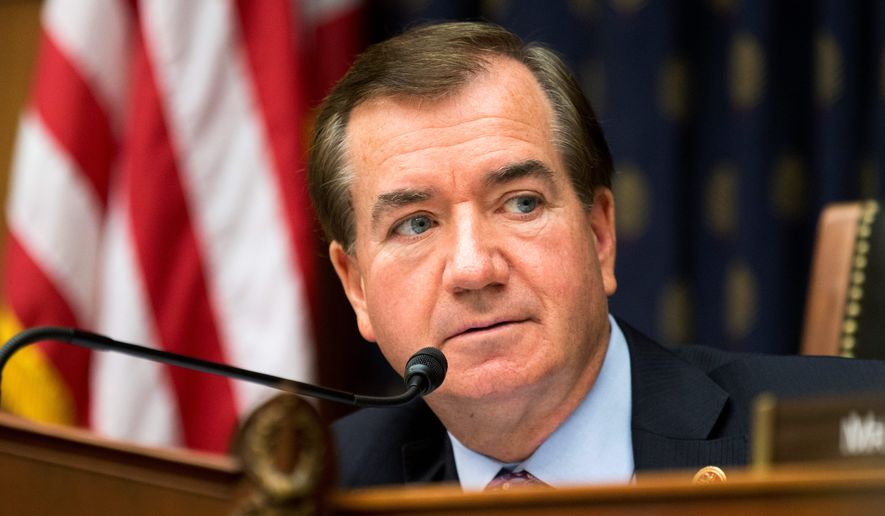Six detainees were released from Guantanamo Bay in December with no restraints to mitigate the risk of their return to battle — an action “inconsistent with U.S. law,” the leader of the House Foreign Affairs Committee said Wednesday.
Rep. Edward R. Royce, California Republican, said that, despite a law requiring the administration to take preventive steps to ensure detainees don’t engage in terrorist activities after their release, six prisoners were sent to Uruguay with no restrictions or coordination with the local government.
“It was surprising and very concerning that senior Uruguayan officials asserted that they had not imposed or accepted any conditions when they agreed to receive these former detainees,” Mr. Royce said in a letter to Secretary of State John F. Kerry. “In December, the Uruguayan defense minister clearly stated ’They will not be restricted in any way.’”
Typical restraints placed on released detainees include travel restrictions, monitoring by the local government and information-sharing with the U.S., a Defense Department spokesman said.
As those in the U.S. become more concerned about the security threat the released prisoners pose, the detainees are not happy with their newfound freedom in Uruguay either. The Wall Street Journal reported last week that four of the six former prisoners have set up a protest camp outside the U.S. Embassy in Montevideo to demand that the U.S. provide housing and income for them.
The inmates said they do not speak Spanish, have no relevant work skills and can’t reunite with their families or obtain passports, the article said.
“If the Uruguayan government cannot take care of us, the U.S. government should,” Ali Shabaan told The Wall Street Journal. “It’s not easy to adapt to freedom after such a long time. Even if we were released into our own countries, it would be hard.”
The release of the six detainees to Uruguay was part of an uptick in transfers late last year. Nine other prisoners were released in December and seven were released in November.
President Obama made a campaign promise to close the prison within one year of taking office. With less than two years remaining in his second and final term, 122 detainees remain at Guantanamo Bay.
As Republicans in Congress try to halt the president’s push to close the prison, Democrats are urging him to release detainees more quickly to shut down Guantanamo before leaving office in early 2017.
“Although onerous restrictions imposed by Congress have hindered efforts to close the detention facility, we urge you to immediately take meaningful action in order to end this unfortunate chapter in our nation’s history before you leave office,” three top Senate Democrats wrote in a letter to the president Monday. “With only 20 months remaining in your presidency, time is of the essence.”
The letter from Sens. Patrick J. Leahy of Vermont, Richard J. Durbin of Illinois and Dianne Feinstein of California said that leaving the prison open weakens the country’s national security and is “reckless fiscal policy” under such a tight budget environment. Each prisoner kept at Guantanamo Bay costs the government more than $3 million a year, the letter said.
The Uruguay release is not the first time the administration has ignored a requirement for releasing Gitmo detainees. Despite a law that requires the administration to provide 30 days’ notice before any prisoners are transferred, the president failed to notify Congress when five detainees were released in May in exchange for Army Sgt. Bowe Bergdahl, who was held as a Taliban prisoner of war.
Those prisoners, nicknamed the “Taliban Five,” were released to Qatar under the supervision of the local government and were prohibited from leaving the country for one year. Despite the restrictions, at least one is suspected of trying to re-engage in terrorist activities, according to media reports.
The U.S. began talks last week with officials in Qatar to extend the restrictions on the former detainees’ movements beyond their expiration at the end of this month, The Washington Post reported.
The annual defense policy bill that passed the House Armed Services Committee last week would crack down on the president’s authority by extending prohibitions on transferring prisoners to the U.S. while adding restrictions such as banning transfers to combat zones.
The bill also would withhold a portion of the Defense Department’s funding until the administration provides unredacted documentation on the prisoner swap for Sgt. Bergdahl.
The committee’s version of the bill still needs to pass the full House and be reconciled with Senate negotiators before heading to the president for his signature.
• Jacqueline Klimas can be reached at jklimas@washingtontimes.com.




Please read our comment policy before commenting.